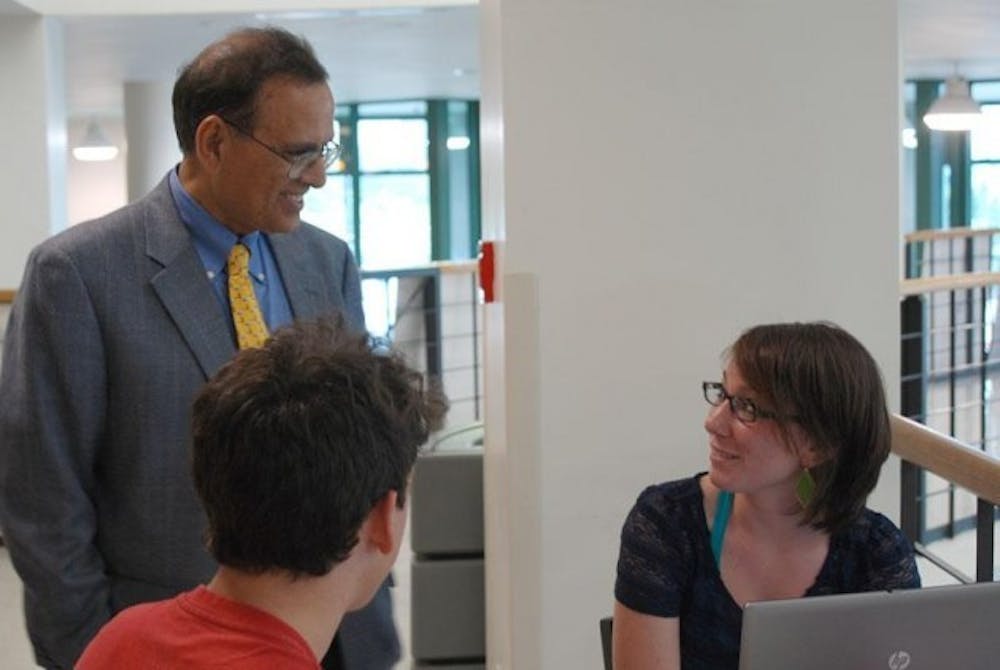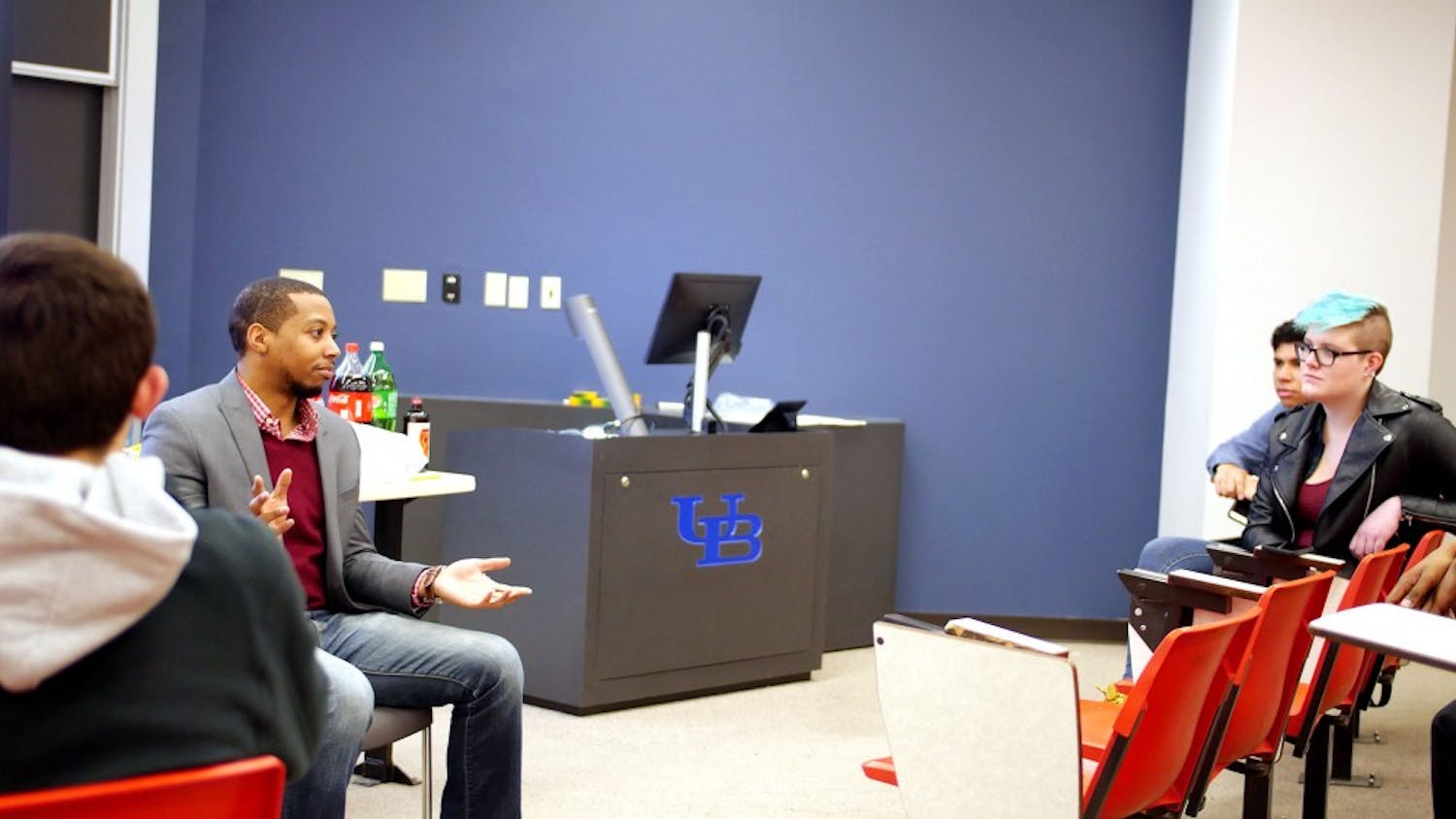The Spectrum sat down with President Satish K. Tripathi to discuss all matters UB related at the start of the new year.
Ask Satish K. Tripathi about his vision for the UB, and he'll tell you about the three E's: excellence, engagement and efficiency.
Tripathi, who will be inaugurated as UB's 15th president on Sept. 23, has plans for the university that span beyond the three campuses and involve state and global interactions.
Global
"We want an excellent global university. I don't mean that we are everywhere; what I mean is that the students here are educated in the global sense," Tripathi said. "They have knowledge about what's going on elsewhere. They have experience studying abroad. They have experience working with people from different cultures."
Tripathi has led a strategic planning process for UB's international programs that has expanded the university's global reach and fosters globalization on each of UB's three campuses. He has helped to develop relationships with universities in 55 countries; educational programs already exist in Europe, Asia and Africa.
In 1847, the university was still a private medical institution; there was one international student in a graduating class of 18 students.
"It's something that's been in the genes of UB for a long time," Tripathi said of the university's commitment to a developed international infrastructure.
The university study abroad rate currently hovers around 10 percent, and administrators hope that that number will increase to 20 percent. With increased participation in global programs will come increased marketability for graduates.
"When you go to work somewhere, as you graduate and hopefully find a job somewhere, your workplace is going to be totally international," Tripathi said. "You might not be seeing people together, but you're working with people all around the world. You become a different person, you become a different student, you become a different graduate."
Local
Despite the emphasis on globalization, Tripathi remains dedicated to UB2020, an ambitious initiative dedicated to establishing and preserving UB's status as a premier research institution.
On June 24, the New York State Senate approved the NYSUNY 2020 tuition bill. For UB, the legislation allows progression with UB2020 plans. The Empire State Development Corporation and the SUNY construction fund will provide $140 million for development projects at each SUNY university center (Albany, Binghamton, Buffalo, and Stony Brook).
The NYSUNY 2020 bill allows the university to raise tuition $300 annually for five years. University affiliates have raised concerns that the funds will be put solely towards construction initiatives detailed in the UB2020 plan.
"The tuition raised from the students is all going into faculty and staff hirings: creating the infrastructure for students' education," Tripathi said. "That money is not going into building buildings."
Currently, the most visible component of the UB2020 plan is the construction of a medical campus in downtown Buffalo, expected to be completed in 2016. The project will result in a $375 million investment in the city; $35 million will be provided by the state through the NYSUNY 2020 law and the remainder will be funded by local organizations and nonprofits, and philanthropic money that is donated to the UB Foundation.
Medical students will bear the brunt of construction costs through the medical students' fee and increases in their tuition, according to Tripathi.
UB administrators look to work more closely with other SUNY colleges and university centers to advance research and New York State's economic situation.
"You can see things in Buffalo changing. Things can be done more efficiently when we're working together," Tripathi said.
Through implementation of UB2020 and NYSUNY 2020, UB can truly become an "economic engine" in the Buffalo-Niagara region, said Tripathi, citing a tree-branch effect of job growth: the hiring of additional faculty will result in as many as 1,000 new jobs in the region, both inside and outside UB.
"It's not just hiring faculty and researches but also creating jobs through ideas that come out of the university," Tripathi said.
University
Tripathi left the University of California, Riverside to join the UB community in 2004.
"I saw the potential and I saw that I could contribute something," Tripathi said. "I don't want a job where I can't contribute. I saw that we really have a lot of great things here and there are a lot of things to be done."
Excellence in education, he said, begins in the classroom.
Within the next five years, the university will grow its faculty by 300 — the student to teacher ratio will decrease.
"The thing I worry most about is how do I hire excellent faculty, and retain them, and how do I get the best students and train them," Tripathi said.
Tripathi was recently named to Governor Andrew Cuomo's Regional Economic Development Council as the Western New York representative. Increased interaction with businesspeople, and the managers of nonprofits and organizations, will give him a broader understanding of Western New York economics.
"I think my involvement [on Governor Cuomo's economic development council] is really a recognition of the role UB plays. I'm representing UB in some sense," Tripathi said.
Tripathi stresses that there are two core constituencies at UB — the faculty and the students — that the administration exists to support.
"From an education viewpoint, I'm really excited because we have matured in terms of the undergraduate academies we have and how they have attracted students and what they can do, whether it's community service, whether it's globalization, or whether it's undergraduate research," Tripathi said.
This year's freshman class is the most talented in UB's history, yet Tripathi remains concerned that the university will be able to attract the best students.
"[We need to] provide them with the facilities, infrastructure, and education so they will stay here," Tripathi said, referencing the measures detailed in the UB2020 plan to advance the university's appeal to students.
His Office
Tripathi has been in his new office for four months. He spends 10 to 12 hours per day there in Capen Hall, going to meetings in the city, and spending time amongst students on campus.
"I was walking to lunch today in the Commons through Founders Plaza and it was really full of people going to classes," Tripathi said. "[Students are] smiling, they're on their cell phones, they're talking. It's very exciting, it's energized. In the summer it was a little slow, but now they're back."
Email: news@ubspectrum.com





